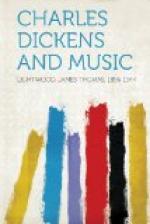When Dickens wrote his earlier works it was not considered the correct thing for a gentleman to play the piano, though it might be all very well for the lower classes and the music teacher. Consequently we read of few male performers on the instrument. Mr. Skimpole could play the piano, and of course Jasper had a ‘grand’ in his room at Cloisterham.
At one time, if we may believe the turnkey at the Marshalsea prison, William Dorrit had been a pianist, a fact which raised him greatly in the turnkey’s opinion.
Brought up as a gentleman, he was, if ever a man was. Educated at no end of expense. Went into the Marshal’s house once to try a new piano for him. Played it, I understand, like one o’clock—beautiful.
In the Collected Papers we have a picture of the ’throwing off young gentleman,’ who strikes a note or two upon the piano, and accompanies it correctly (by dint of laborious practice) with his voice. He assures
a circle of wondering listeners
that so acute was his
ear that he was wholly unable
to sing out of tune,
let him try as he would.
Mr. Weller senior laid a deep plot in which a piano was to take a prominent part. His object was to effect Mr. Pickwick’s escape from the Fleet.
Me and a cab’net-maker has dewised a plan for gettin’ him out. ‘A pianner, Samivel, a pianner,’ said Mr. Weller, striking his son on the chest with the back of his hand, and falling back a step or two.
‘Wot do you mean?’ said Sam.
‘A pianner-forty, Samivel,’
rejoined Mr. Weller, in a
still more mysterious manner,
’as he can have on hire;
vun as von’t play, Sammy.’
’And wot ‘ud be the good of that?’ said Sam.
‘There ain’t no
vurks in it,’ whispered his father. ’It
’ull hold him easy,
vith his hat and shoes on; and
breathe through the legs,
vich is holler.’
But the usually dutiful Sam showed so little enthusiasm for his father’s scheme that nothing more was heard of it.
CHAPTER III
VARIOUS INSTRUMENTS
FLUTE, ORGAN, GUITAR (AND SOME HUMMERS)
Flute
We find several references to the flute, and Dickens contrives to get much innocent fun out of it. First comes Mr. Mell, who used to carry his instrument about with him and who, in response to his mother’s invitation to ‘have a blow at it’ while David Copperfield was having his breakfast, made, said David, ’the most dismal sounds I have ever heard produced by any means, natural or artificial.’ After he had finished he unscrewed his flute into three pieces, and deposited them underneath the skirts of his coat.
Dickens’ schoolmasters seem to have been partial to the flute. Mr. Squeers, it is true, was not a flautist, but Mr. Feeder, B.A., was, or rather he was going to be. When little Paul Dombey visited his tutor’s room he saw ’a flute which Mr. Feeder couldn’t play yet, but was going to make a point of learning, he said, hanging up over the fireplace.’




